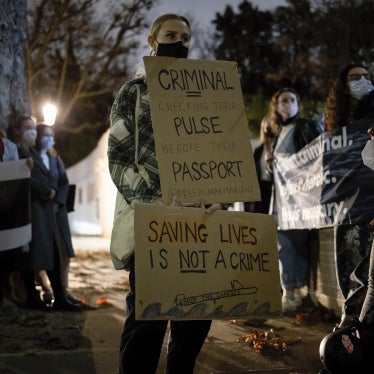Russia’s Supreme Court should determine whether a nuclear scientist convicted of treason received a fair trial, Human Rights Watch said today. Tomorrow the court will hear an appeal from Igor Sutiagin, who in April was sentenced to 15 years in prison for passing information to U.S. intelligence services.
“Igor Sutiagin didn’t get a fair trial, and we’re concerned that he may have been the victim of politically motivated charges,” said Rachel Denber, acting executive director of Human Rights Watch’s Europe and Central Asia division. “The Supreme Court needs to prevent a gross miscarriage of justice.”
In June the Council of Europe’s Parliamentary Assembly appointed a special rapporteur specifically to examine Igor Sutiagin’s case, reflecting growing concern about it in Europe.
The Federal Security Service (FSB, the successor to the KGB) had accused Sutiagin of collecting materials on a variety of military issues and passing them on to U.S. intelligence services. Sutiagin has acknowledged that he collected information on these issues from open sources for a U.K.-based consultancy firm, but he denies any knowledge of the consultancy firm being in any way linked to a foreign intelligence agency. His sentence was the longest prison term for high treason since Soviet times.
The nature of the espionage charges and the conduct of the trial have raised serious concerns that the case was brought for political reasons. In crucial instances prior to Sutiagin’s trial, the FSB sent the wrong documents to experts who were supposed to review Sutiagin’s work for the court to determine whether it was based on open sources. The presiding judge in his trial at the Moscow City Court and the composition of the jury were changed without explanation. The presiding judge excluded key questions of fact from the jury’s deliberations.
The prosecution brought vaguely formulated charges, failed to identify the secret sources from which Sutiagin allegedly received his materials, and made use of secret decrees in its case against him.
Sutiagin has already spent four and a half years in pretrial prisons.
Sutiagin’s case is one in a series of dubious espionage prosecutions brought against independent scientists, journalists and environmentalists in the past decade that seem aimed at chilling expression on such sensitive topics as nuclear pollution, arms transfers, and the like. For more on this trend, see Human Rights Watch’s October 2003 briefing paper, “ Russia’s Spy Mania: A Study of the Case of Igor Sutiagin.”
“It is essential that Supreme Court right the wrongs of the lower courts,” said Denber. “Previous court rulings on Sutiagin’s case left too many questions about their compliance with Russian and international law.”
On June 2, Amnesty International, Human Rights Watch, the International Helsinki Federation for Human Rights, the Moscow Helsinki Group, and the Public Committee for the Protection of Scientists issued a joint statement calling for a retrial in accordance with international fair trial standards and the immediate release of Igor Sutiagin from prison pending retrial.







